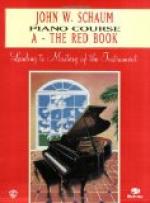FINGERING
“One point Paderewski is very particular about, and that is fingering. He often carefully marks the fingering for a whole piece; once this is decided upon it must be kept to. He believes in employing a fingering which is most comfortable to the hand, as well as one which, in the long run, will render the passage most effective. He is most sensitive to the choice of fingering the player makes, and believes that each finger can produce a different quality of tone. Once, when I was playing a Nocturne, he called to me from the other end of the room: ’Why do you always play that note with the fourth finger? I can hear you do it; the effect is bad,’ He has a keen power of observation; he notices little details which pass unheeded by most people; nothing escapes him. This power, directed to music, makes him the most careful and painstaking of teachers. At the same time, in the matter of fingering, he endeavors to choose the one which can be most easily accomplished by the player. The Von Buelow editions, while very erudite, are apt to be laborious and pedantic; they show the German tendency to over-elaboration, which, when carried too far becomes a positive fault.
CORRECT MOTION
“Another principle Paderewski considers very important is that of appropriate motion. He believes in the elimination of every unnecessary movement, yet he wishes the whole body free and supple. Motions should be as carefully studied as other technical points. It is true he often makes large movements of arm, but they are all thought out and have a dramatic significance. He may lift the finger off a vehement staccato note by quick up-arm motion, in a flash of vigorous enthusiasm; but the next instant his hand is in quiet position for the following phrase.
STUDYING EFFECTS
“The intent listening I spoke of just now must be of vital assistance to the player in his search for tonal variety and effect. Tone production naturally varies according to the space which is to be filled. Greater effort must be put forth in a large hall, to make the tone carry over the footlights, to render the touch clear, the accents decisive and contrasts pronounced. In order to become accustomed to these conditions, the studio piano can be kept closed, and touch must necessarily be made stronger to produce the desired power.
INTERPRETATION
“A great artist’s performance of a noble work ought to sound like a spontaneous improvisation; the greater the artist the more completely will this result be attained. In order to arrive at this result, however, the composition must be dissected in minutest detail. Inspiration comes with the first conception of the interpretation of the piece. Afterward all details are painstakingly worked out, until the ideal blossoms into the perfectly executed performance. Paderewski endeavors uniformly to render a piece in the manner and spirit in which he has conceived it. He relates that after one of his recitals, a lady said to him:




